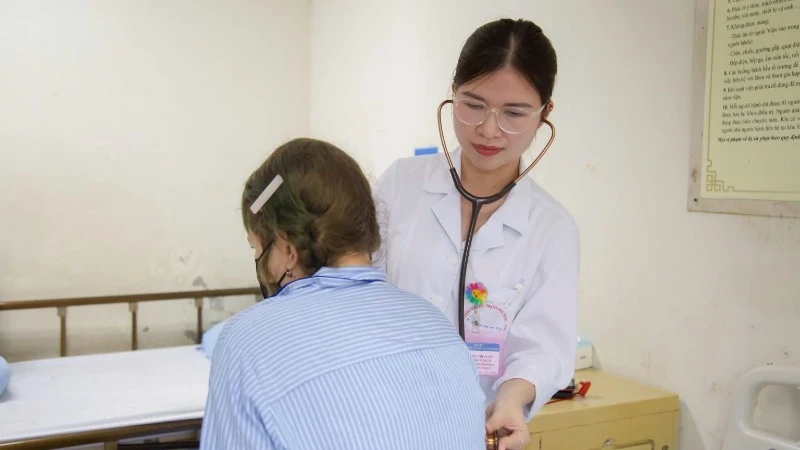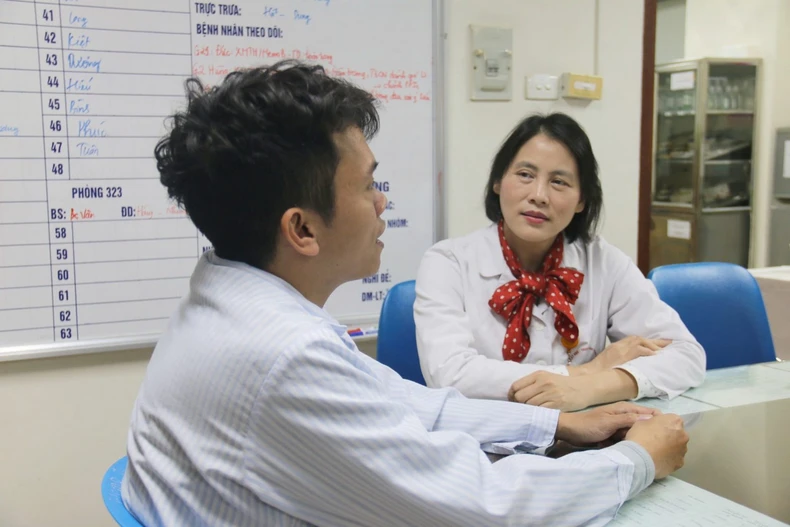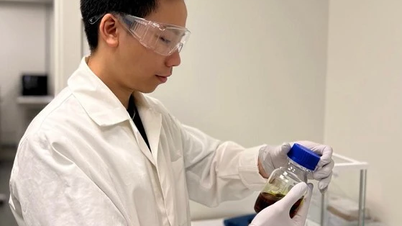
10 surgeries, life-threatening due to bleeding disorder
Ms. Tran Minh T (born in 1984) often suffered from nosebleeds when she was young. When she reached puberty, her menstrual period often lasted for weeks, sometimes up to 10 days, making her pale and tired.
At the age of 20, she got married and became pregnant with her first child. But about 7 days after giving birth, she suffered from postpartum hemorrhage, bleeding profusely, the stitches were swollen, and her red blood cell count dropped sharply. She was forced to have half of her uterus removed to save her life, but the bleeding could not be stopped. She was taken to a central hospital for emergency care. After 4 hours in the operating room, she fell into a state of exhaustion due to massive bleeding, forcing her to have her entire uterus removed.
After 7-8 surgeries and being hospitalized for nearly 4 months, missing her child terribly, there was a time when her chance of survival was only 2 in 1. Her family was mentally prepared for the worst.
She was then transferred to the Central Institute of Hematology and Blood Transfusion for treatment. Here, she was diagnosed with factor X deficiency, a blood clotting disorder rare
In the following years, she underwent surgery for an ovarian cyst and had one ovary removed. Her subsequent surgeries were all consulted by obstetricians and surgeons in consultation with doctors from the National Institute of Hematology and Blood Transfusion. She received plasma transfusions before, during and after the surgery, so the surgery was safe.
For this 42-year-old woman, after nearly 10 surgeries plus countless times of bleeding, close to death, being able to live is a great happiness.
Mai Hoang V. (born in 1991) also has a disease. blood clotting disorder von Willebrand. When she was just 2 years old and learning to walk, she fell and cut her lip, which bled profusely. She had to be hospitalized to stop the bleeding.
But luckier than Ms. Minh T., Ms. Mai Hoang V. was diagnosed early and treated regularly at the Central Institute of Hematology and Blood Transfusion. Every time she had a large wound, bleeding gums or heavy menstruation, she was hospitalized to receive a transfusion of cryoprecipitate (a type of blood product) to stop the bleeding.
Following the advice of doctors at the Hemophilia Center, National Institute of Hematology and Blood Transfusion, she proactively went for check-ups throughout her pregnancy and childbirth.
Having been mentally prepared in advance, V. regularly went to the Central Obstetrics Hospital and the Central Institute of Hematology and Blood Transfusion for prenatal check-ups. Doctors from both hospitals regularly coordinated and discussed treatment plans. During her pregnancy and cesarean section, V. was given blood products to prevent bleeding and was closely monitored by doctors even after giving birth.
The dangers of bleeding disorders
Dr. Nguyen Thi Mai, Director of the Hemophilia Center, National Institute of Hematology and Blood Transfusion, said, bleeding disorder is a complex group of diseases, including many rare blood clotting disorders such as deficiency of one of the clotting factors I, II, V, VII, X, XI, XIII...

Bleeding disorders can occur in both men and women. In addition to the common symptoms similar to men, in women, bleeding disorders also affect many other issues such as menstruation, pregnancy, and beauty, so they have a significant impact on personal life.
"Currently, many bleeding disorders are detected late, leading to serious consequences," Dr. Mai warned.
One of the reasons is that the symptoms of blood clotting disorders can be heavy bleeding during menstruation and women often think that this is a private matter so they hesitate to go to the doctor or share it with others. In addition, in the patient's family, there may be other female members such as mother, sister, younger sister... who also have heavy bleeding so they consider it normal.
Dr. Nguyen Thi Mai recommends that when you have symptoms such as menorrhagia, nosebleeds, bleeding gums, bruising, etc., you should see a doctor early for diagnosis.
"Women with bleeding disorders need to be managed and monitored, especially need to be counseled before marriage and before giving birth. Bleeding disorders not only affect the lives of the mother and baby during childbirth but also pose a genetic risk to the child," said Dr. Mai.
When getting married, doctors will advise on premarital testing plans, use of contraceptive methods appropriate to the characteristics of the disease, and safe pregnancy. Many women may bleed during pregnancy and need preventive treatment to ensure the baby is born safely, reduce the risk of bleeding in the mother and reduce the risk of trauma to the baby during labor.
The doctor will also advise on a care plan if the baby unfortunately has a genetic blood clotting disorder, such as switching vitamin K supplements from injection to oral form, and being cautious about heel prick blood tests.
Source: https://baolangson.vn/can-ke-cua-tu-vi-mac-benh-roi-loan-chay-mau-hiem-gap-5044255.html




![[Photo] Prime Minister Pham Minh Chinh holds talks with Prime Minister of the Kingdom of Thailand Paetongtarn Shinawatra](https://vphoto.vietnam.vn/thumb/1200x675/vietnam/resource/IMAGE/2025/5/16/23b5dd1e595d429491a54e3c1548fb79)
![[Photo] Welcoming ceremony for Prime Minister of the Kingdom of Thailand Paetongtarn Shinawatra on official visit to Vietnam](https://vphoto.vietnam.vn/thumb/1200x675/vietnam/resource/IMAGE/2025/5/16/cdd9e93739c54bb2858d76c3b203b437)

















































































Comment (0)